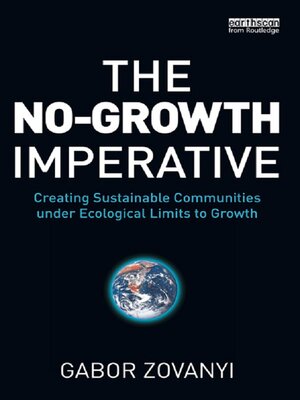The No-Growth Imperative
ebook ∣ Creating Sustainable Communities under Ecological Limits to Growth
By Gabor Zovanyi

Sign up to save your library
With an OverDrive account, you can save your favorite libraries for at-a-glance information about availability. Find out more about OverDrive accounts.
Find this title in Libby, the library reading app by OverDrive.



Search for a digital library with this title
Title found at these libraries:
| Library Name | Distance |
|---|---|
| Loading... |
More than two decades of mounting evidence confirms that the existing scale of the human enterprise has surpassed global ecological limits to growth. Based on such limits, The No-Growth Imperative discounts current efforts to maintain growth through eco-efficiency initiatives and smart-growth programs, and argues that growth is inherently unsustainable and that the true nature of the challenge confronting us now is one of replacing the current growth imperative with a no-growth imperative.
Gabor Zovanyi asserts that anything less than stopping growth would merely slow today's dramatic degradation and destruction of ecosystems and their critical life-support services. Zovanyi makes the case that local communities must take action to stop their unsustainable demographic, economic, and urban increases, as an essential prerequisite to the realization of sustainable states.
The book presents rationales and legally defensible strategies for stopping growth in local jurisdictions, and portrays the viability of no-growth communities by outlining their likely economic, social, political, and physical features. It will serve as a resource for those interested in shifting the focus of planning from growth accommodation to the creation of stable, sustainable communities. While conceding the challenges associated with transforming communities into no-growth entities, Zovanyi concludes by presenting evidence that suggests that prospects for realizing states of no growth are greater than might be assumed.






